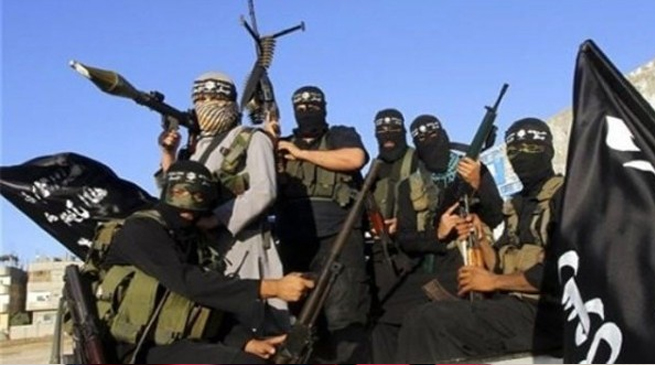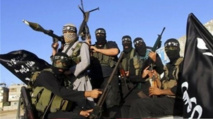"The Tunisian people have proven that they will not give in to terrorism. My thanks go out to all and I tell the Tunisian people: 'Forwards. You are not alone,'" President Beji Caid Essebsi said after joining the march with foreign dignitaries.
French President Francois Hollande, whose country held a similar march after January's attacks in Paris, was among the figures attending along with Italian Prime Minister Matteo Renzi and Palestinian leader Mahmud Abbas.
"We must all fight against terrorism," Hollande told reporters after the march. "Tunisians wanted this international solidarity."
Renzi said: "We are here today to give a message of hope... We want to say that Tunisia does not stand alone: we are together in combating terrorism."
Tunisian authorities earlier said Lokmane Abou Sakhr -- an Algerian who allegedly masterminded the museum attack -- was killed along with at least eight others from the notorious Okba Ibn Nafaa Brigade.
Officials had accused Abou Sakhr and his group of organising the attack on the Bardo National Museum carried out by two gunmen who were shot dead, despite a claim of responsibility from the Islamic State jihadist group.
Tunisian forces "were able yesterday (Saturday) to kill the most important members of the Okba Ibn Nafaa Brigade including its head Lokmane Abou Sakhr," Prime Minister Habib Essid told reporters.
Interior ministry spokesman Mohamed Ali Aroui told AFP that security forces had killed "nine terrorists" in an operation in the west-central area of Sidi Aich.
Interior Minister Gharsalli Najem told a news conference they had been shot at a checkpoint while travelling by car.
Authorities say Okba Ibn Nafaa has been behind a series of attacks on security forces that have left some 60 dead since late 2012.
- 'Leave us in peace' -
During the official march, a stone tablet was unveiled with the names of the foreign tourists and a Tunisian policeman killed in the attack.
The authorities gave no immediate estimate for the number of participants in the march, which took place amid tight security.
"Tunisia is not a country of jihad, extremism and terrorism!" yelled Majda Friga, a participant wrapped in the Tunisian flag.
"Let the terrorists leave our lands. Let them go to hell and leave us in peace," said Fadhila Lahmar, a woman in her 60s.
Tunisia has seen an upsurge in Islamic extremism since overthrowing longtime strongman Zine El Abidine Ben Ali in 2011, but it has taken pride in forming a democratic government since the Arab Spring -- in marked contrast to countries such as Libya, Syria and Yemen.
The moderate Islamist Ennahda main opposition party called on its supporters to join the march "as an expression of Tunisian unity".
The country's powerful UGTT trade union also urged its supporters to take part.
However, the leftist opposition Popular Front called for a boycott, accusing some participants of "hypocrisy", referring to accusations that the Islamists in power after Tunisia's 2011 revolution had failed to act against jihadists.
The march in Tunis echoed a similar anti-extremism demonstration in Paris after the deadly attacks on the Charlie Hebdo satirical weekly and a kosher supermarket.
The tourists killed at the museum were from Italy, Japan, France, Spain, Colombia, Australia, Britain, Belgium, Poland and Russia.
Officials have described the attack as "a big blow" to Tunisia's crucial tourism industry.
Authorities have arrested nearly two dozen suspects in connection with the attack and fired senior police officials over alleged security failures.
---------------------------------------------------------------------------------------------------------------
French President Francois Hollande, whose country held a similar march after January's attacks in Paris, was among the figures attending along with Italian Prime Minister Matteo Renzi and Palestinian leader Mahmud Abbas.
"We must all fight against terrorism," Hollande told reporters after the march. "Tunisians wanted this international solidarity."
Renzi said: "We are here today to give a message of hope... We want to say that Tunisia does not stand alone: we are together in combating terrorism."
Tunisian authorities earlier said Lokmane Abou Sakhr -- an Algerian who allegedly masterminded the museum attack -- was killed along with at least eight others from the notorious Okba Ibn Nafaa Brigade.
Officials had accused Abou Sakhr and his group of organising the attack on the Bardo National Museum carried out by two gunmen who were shot dead, despite a claim of responsibility from the Islamic State jihadist group.
Tunisian forces "were able yesterday (Saturday) to kill the most important members of the Okba Ibn Nafaa Brigade including its head Lokmane Abou Sakhr," Prime Minister Habib Essid told reporters.
Interior ministry spokesman Mohamed Ali Aroui told AFP that security forces had killed "nine terrorists" in an operation in the west-central area of Sidi Aich.
Interior Minister Gharsalli Najem told a news conference they had been shot at a checkpoint while travelling by car.
Authorities say Okba Ibn Nafaa has been behind a series of attacks on security forces that have left some 60 dead since late 2012.
- 'Leave us in peace' -
During the official march, a stone tablet was unveiled with the names of the foreign tourists and a Tunisian policeman killed in the attack.
The authorities gave no immediate estimate for the number of participants in the march, which took place amid tight security.
"Tunisia is not a country of jihad, extremism and terrorism!" yelled Majda Friga, a participant wrapped in the Tunisian flag.
"Let the terrorists leave our lands. Let them go to hell and leave us in peace," said Fadhila Lahmar, a woman in her 60s.
Tunisia has seen an upsurge in Islamic extremism since overthrowing longtime strongman Zine El Abidine Ben Ali in 2011, but it has taken pride in forming a democratic government since the Arab Spring -- in marked contrast to countries such as Libya, Syria and Yemen.
The moderate Islamist Ennahda main opposition party called on its supporters to join the march "as an expression of Tunisian unity".
The country's powerful UGTT trade union also urged its supporters to take part.
However, the leftist opposition Popular Front called for a boycott, accusing some participants of "hypocrisy", referring to accusations that the Islamists in power after Tunisia's 2011 revolution had failed to act against jihadists.
The march in Tunis echoed a similar anti-extremism demonstration in Paris after the deadly attacks on the Charlie Hebdo satirical weekly and a kosher supermarket.
The tourists killed at the museum were from Italy, Japan, France, Spain, Colombia, Australia, Britain, Belgium, Poland and Russia.
Officials have described the attack as "a big blow" to Tunisia's crucial tourism industry.
Authorities have arrested nearly two dozen suspects in connection with the attack and fired senior police officials over alleged security failures.
---------------------------------------------------------------------------------------------------------------









 Home
Home Politics
Politics











